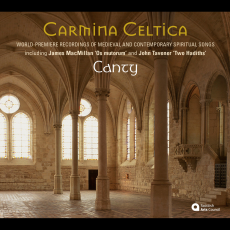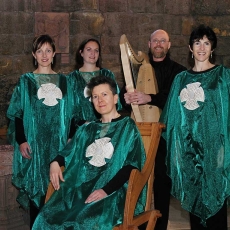Canty - Carmina Celtica - Tempo
Canty, comprising the four regular female singers of Alan Tavener's Cappella Nova, set out with the aim of challenging the male bias in modern performances of early music. Previous discs have featured chant by Hildegard von Bingen and pieces from medieval Scotland and Ireland. When Canty presents liturgical reconstructions of medieval music, Rebecca Tavener commissions new works to ‘connect and comment on that material'. The group's latest CD includes a notable sprinkling of such pieces, supplemented by an exquisite setting of Hildegard's O quam mirabilis that Ivan Moody made for Mandala, an American girls' choir. Rebecca Rowe's There is nothing brighter than the sun, based on words by a 12th-century Muslim mystic, pre-dates the founding of Canty. What their director calls the ‘bardic' approach to Celtic chant is reinforced by harpist William Taylor's improvised accompaniments. He also plays solos taken from 17th-century lute books and later sources. Of his three instruments - a 21- stringed Romanesque harp, a medieval clarsach and a late-medieval bray harp - the resonating bray harp has an integral part in John Tavener's contemplative Two Hadiths, on sayings by the Prophet Mohammed. Some of the disc's other modern pieces resemble their predecessors in having been written in honour of saints. Irishman Michael McGlynn's Lorica sets part of the poem ‘St Patrick's Breastplate'; James McCarthy's The Stars in their Courses and James MacMillan's Os mutorum draw on the texts of antiphons for St Kentigern and St Columba. The American composer Joanne Metcalf wrote O Shining Light for the 2009 St Machar's Cathedral Festival. Sonically, Rebecca Rowe's three-part composition offers perhaps the most striking foil to the medieval items. Gabriel Jackson's animated Ubi flumen praesulis, incorporating verses from Psalm 62, represents the traditional end of the stylistic spectrum. Gaelic heterophony, an early style of psalm-singing, inspired Peter McGarr's Flower Garland, his kaleidoscopic setting of a Marian poem from the ‘Carmina Gadelica'. This piece is well complemented by a Marian motet of Scottish provenance.

